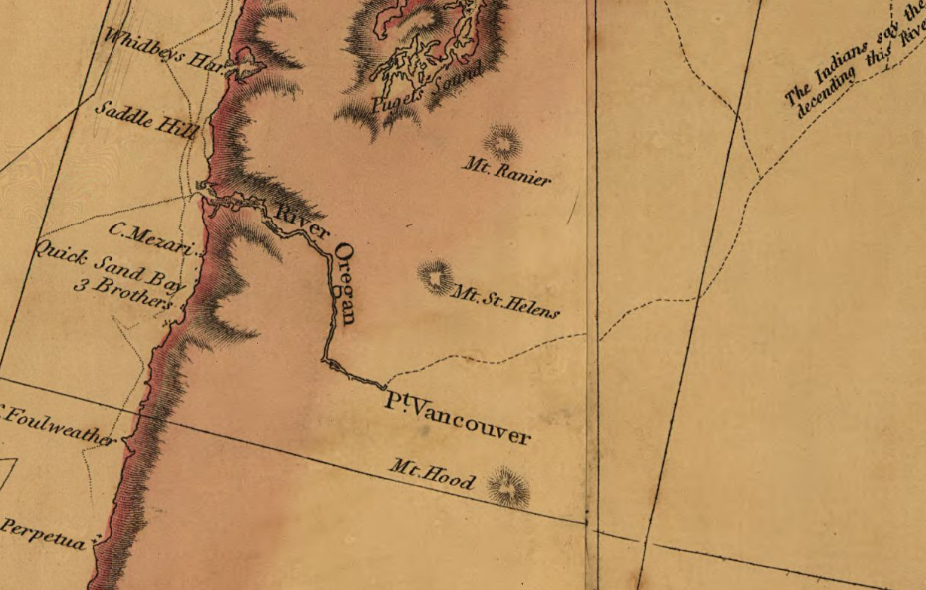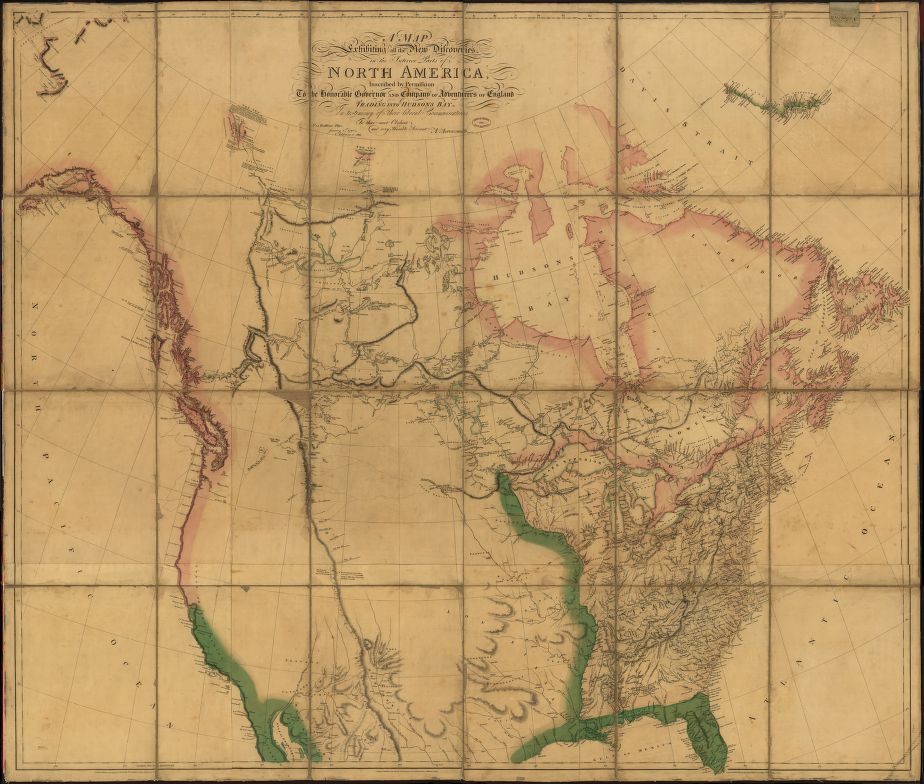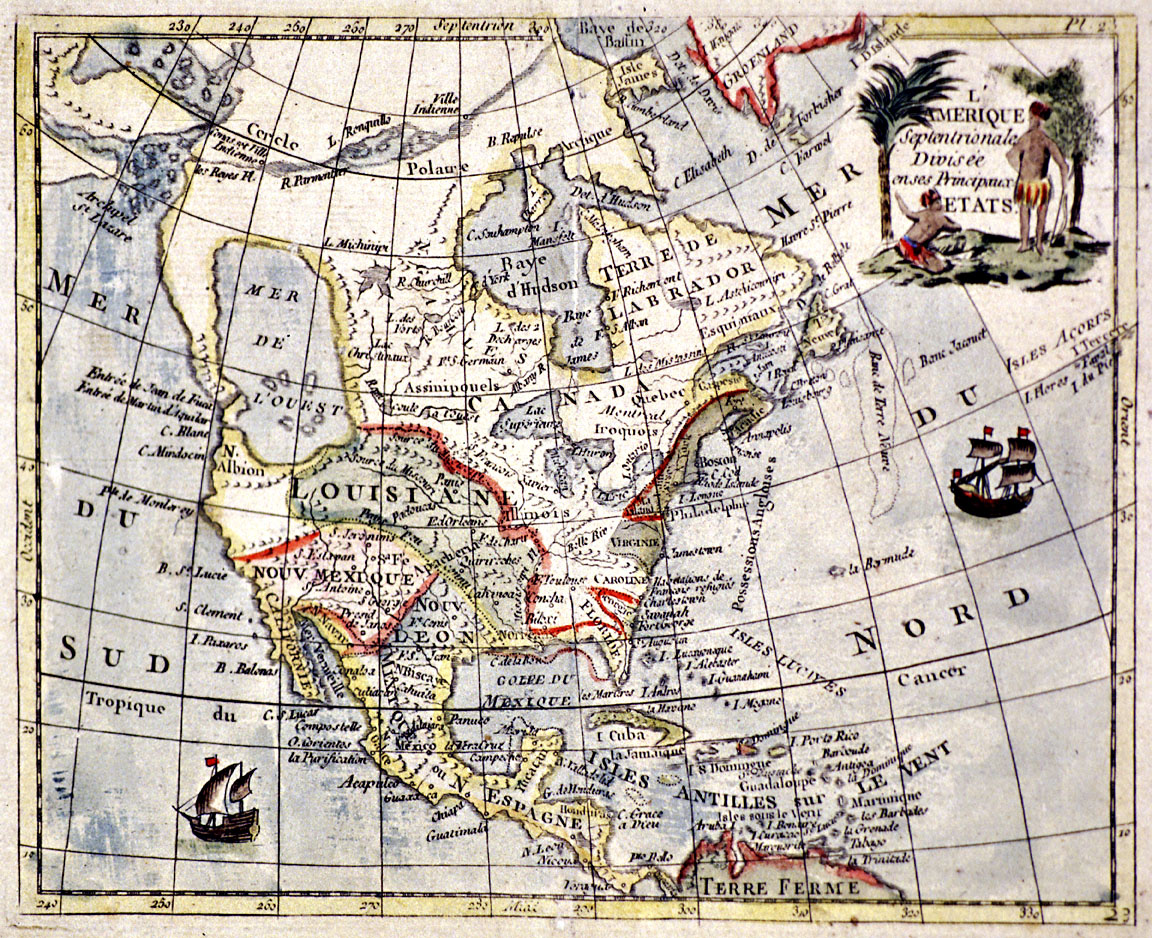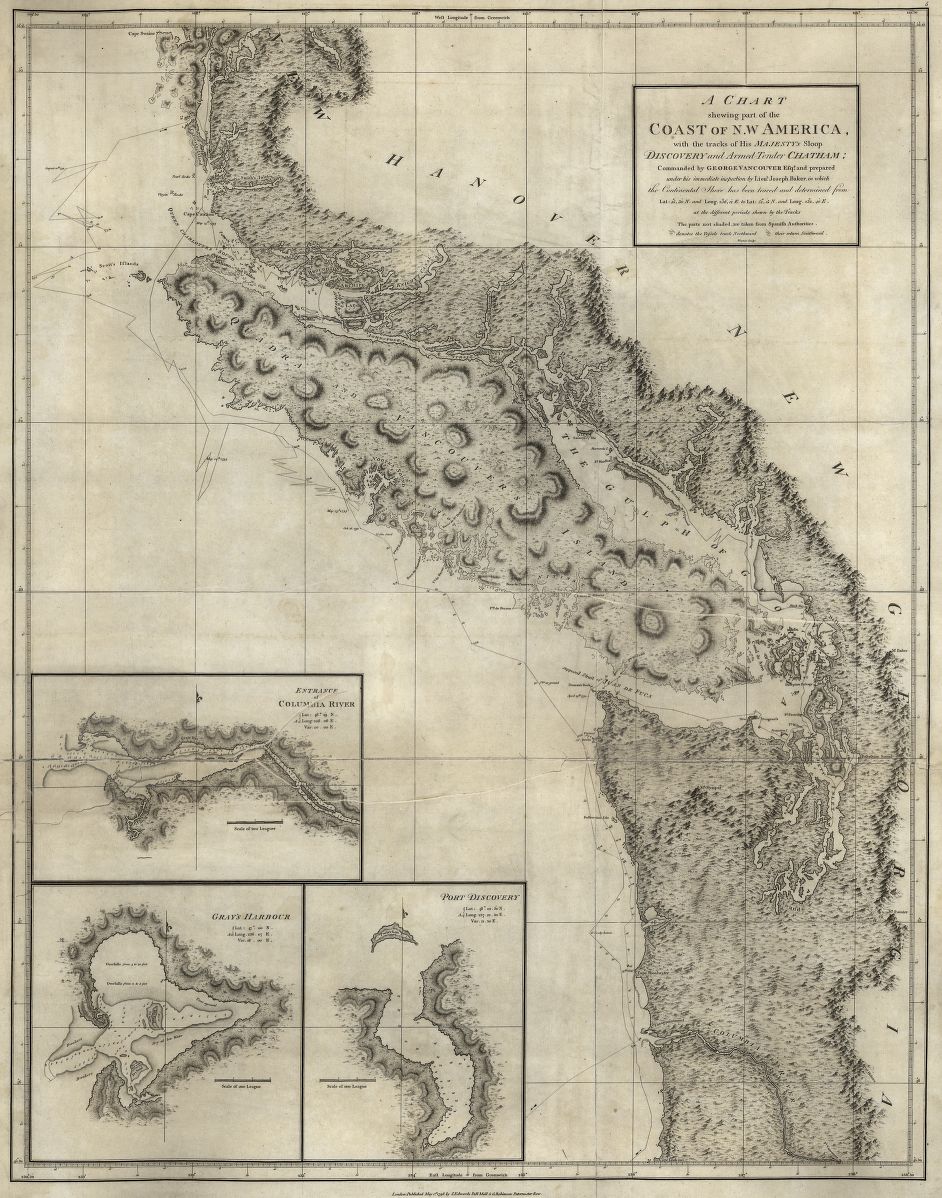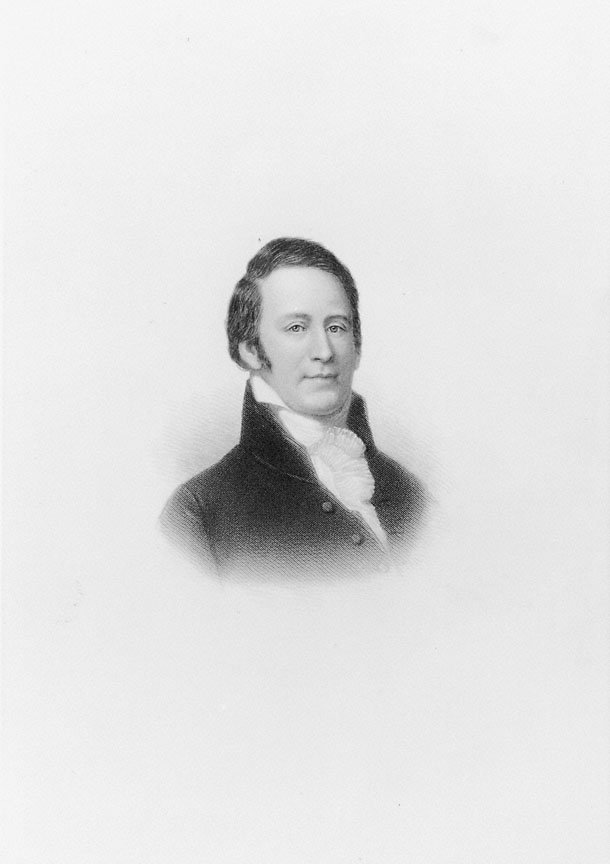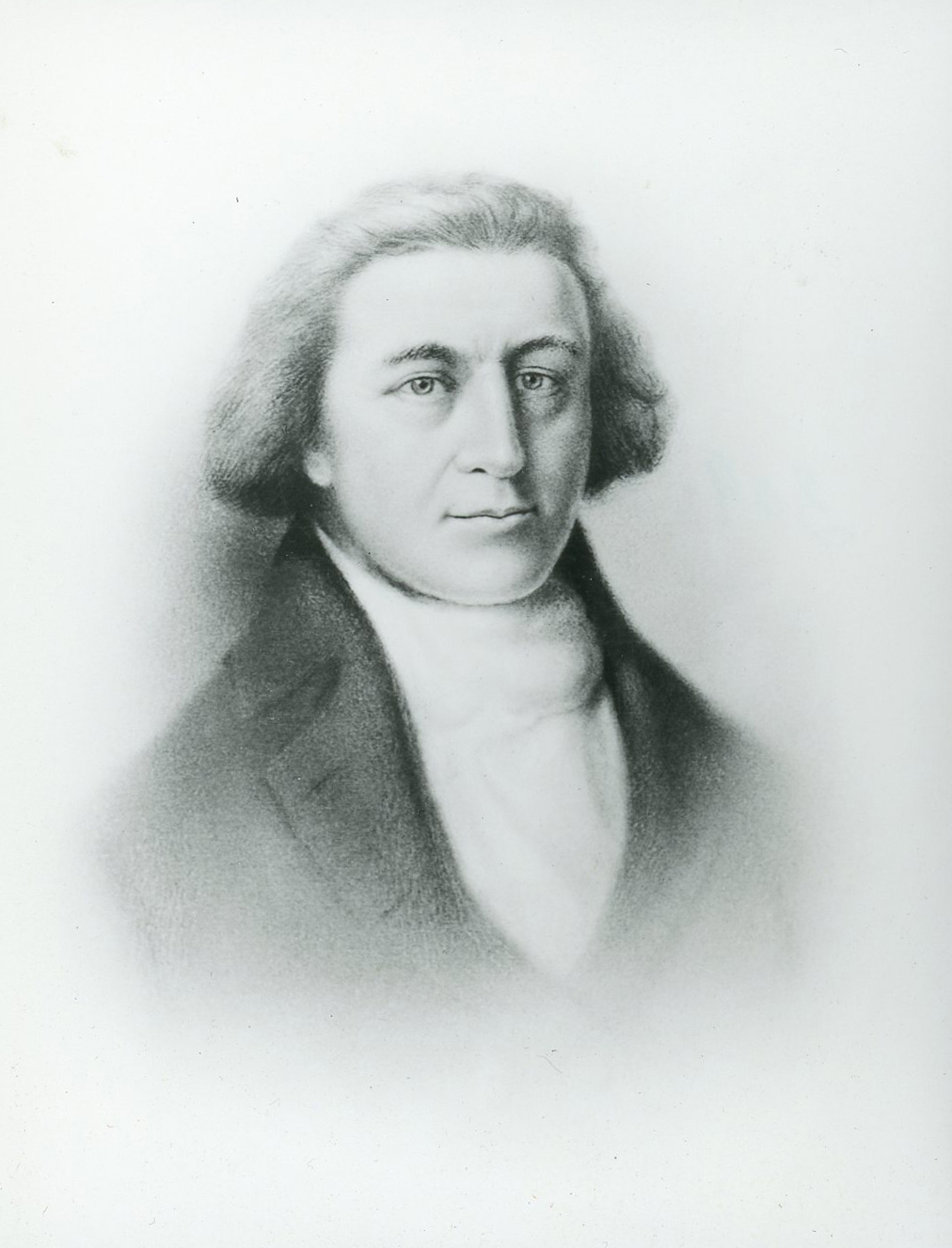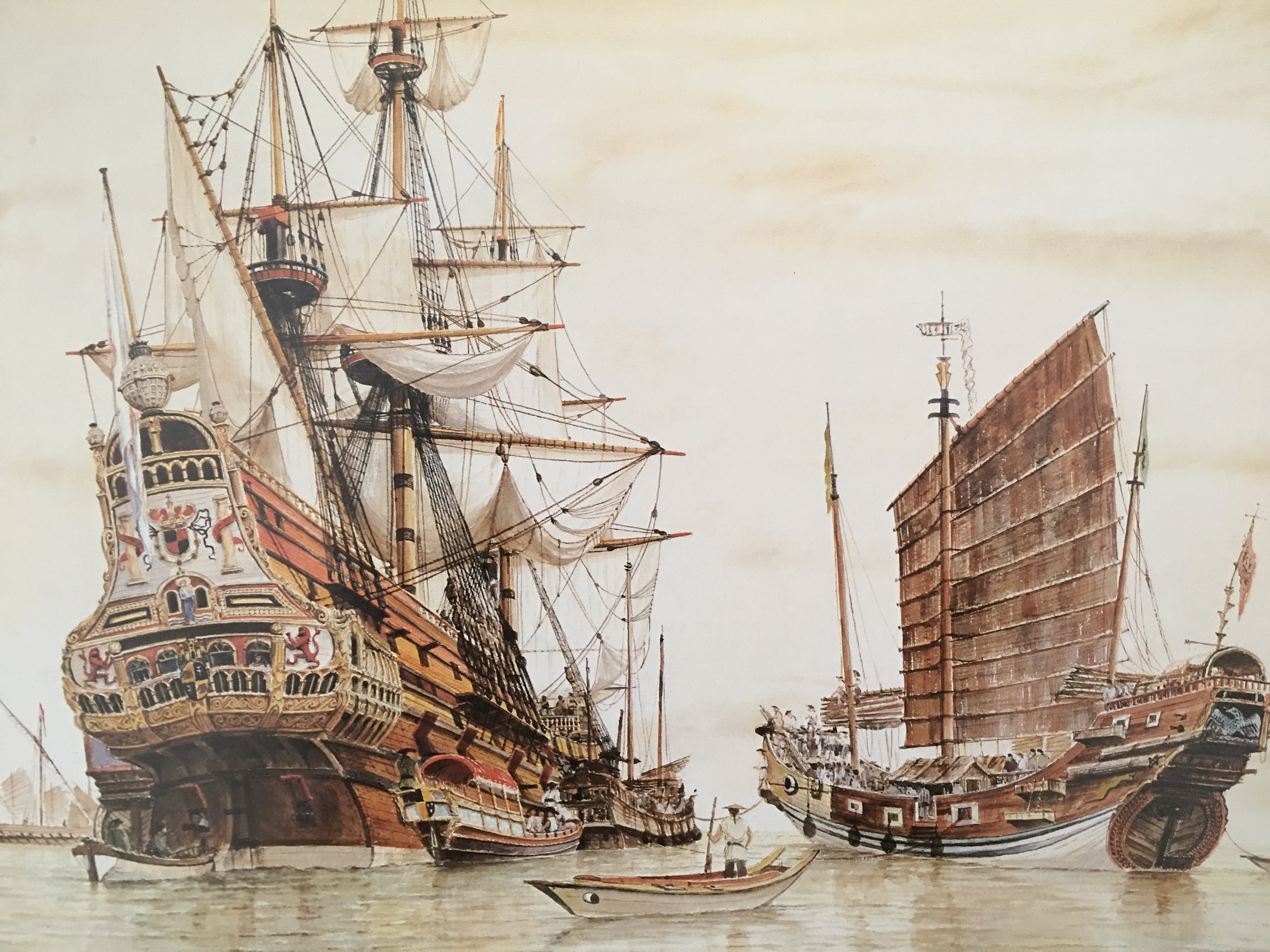Two hundred and fifty years after the place-name appeared on maps and other documents, details of the etymology of the name Oregon are still being debated. There is growing consensus that its origin is most likely Algonquian, a family of Indigenous languages spoken east of the Rocky Mountains and in present-day Canada.
In the early twentieth century, banker and historian Thomas Coit Elliott uncovered a document in a 1765 proposal written by Major Robert Rogers, a colonial soldier. Rogers was petitioning King George III to fund an expedition to find the Northwest Passage by way of “the River called by the Indians Ouragon.” Elliott believed that Rogers, who lived in the Great Lakes region, might have heard the word Ouragon from French traders or Native people who were in contact with the French.
In 1944, historian George R. Stewart, at the University of California, Berkeley, called attention to a 1709 French map on which the name of the Wisconsin River, Ouisiconsink, was spelled Ouaricon-sint, which was clumsily displayed with Ouaricon on one line and sint below. While there is no evidence of Rogers using the map, Stewart thought he might have “heard that on ‘some old map’ there was a river of that name flowing toward the west.”
Two more recent proposals address Rogers’s attribution of the word Ouragan to Indians. In 2001, archaeologist Scott Byram and anthropologist David G. Lewis argued in the Oregon Historical Quarterly that the word ooligan might have been transmitted to the Great Lakes region by means of a complex Indigenous trade network that extended across North America. According to Rogers, the route to the River Ouragon from the Great Lakes followed the trading network known as the “grease trails,” which crossed the Northern Rocky Mountains to the upper Fraser River. The upper Fraser was the habitat of oil-rich candlefish, called ooligan in Chinook Jargon (Chinuk Wawa), a trade language used in the Pacific Northwest. Algonquian speakers from the east of the Rockies would have been familiar with the word ooligan, Byram and Lewis suggested, and the word for the fish might have been extended to refer to the river as well. They also pointed to well-documented changes in pronunciation that would render the word as oorigan in some Algonquian dialects.
Linguist Ives Goddard and anthropologist Thomas Love also proposed Algonquian as the source of Rogers’s Ouragon. They argued that it was adapted as a respelling of the pidgin word wauregan (wau-REE-g’n), which means “the beautiful” and was used by Native people in present-day New England as the name of the Allegheny–Ohio River. Major Rogers had used Mohegan-speaking people as troops in the French and Indian Wars and would have become acquainted with the word from them. In Antoine-Simone Le Page Du Pratz’s Histoire de la Louisiane, Rogers also might have consulted a French map showing a “Belle Riv” flowing to the west beyond the Missouri River. Le Page’s history relates the story of a Yazoo Indian who traveled to the Pacific Ocean along what local Natives called “the beautiful river.” Goddard and Love suggested that Rogers used a word that he already knew meant “beautiful river” to refer to this supposed route to the Pacific.
Goddard and Love also demonstrated the likely connection of wauregan to the earlier place-name Olighin, used by the Western Abenaki of northern New England. The word was first found in the reports of René-Robert Cavelier de la Salle’s exploration of the Mississippi River in 1682 and on a map two years later. In the language of the Mohegans, who were part of la Salle’s expedition, Olighin would be pronounced wiegon or wauregan, and Rogers may have heard the word wauregan decades later. The connection of Oregon to wauregan, Goddard and Love wrote, is an old idea dating to an 1879 study by J. Hammond Trumbull, a philologist of Native languages.
After Rogers used the name, it continued to change and spread. He later appointed Jonathan Carver to lead an exhibition to search for the Northwest Passage. In his widely read Travels through the Interior Part of North America, published in 1778, Carver wrote that one of the rivers he had learned about from Indians was “the Oregon, or River of the West.” It was the first literary use of the name, and it has long been supposed that Carver introduced the word into English.
Not long afterward, in 1790, the River Oregon appeared on a map by Aaron Arrowsmith, showing the “R. Oreġan” flowing to the Pacific. Later maps depict the “R. Oreġan” or “Columbia R.” extending to the headwaters of the Missouri River. Thomas Jefferson was aware of the maps, and in June 1803 he instructed Meriwether Lewis to “explore the Missouri river, & such principal stream of it as by its course and communication with the waters of the Pacific ocean whether the Columbia, Oregon, Colorado or any other river.”
A few years later, poet William Cullen Bryant invoked the Oregon River in “Thanatopsis,” linking it with a barcan dune in North Africa as symbols of west and east. The name of the river was soon extended in American usage for that part of the Pacific Northwest that was north of 42°N latitude and south of 54°40′N latitude. The British referred to the area as the Columbia District. To Americans, it would become the Oregon Territory.
The etymology of the name Oregon had been the subject of speculation during the nineteenth century, before the connection to Major Rogers was understood. From present-day California to Vancouver Island in British Columbia, the Pacific Coast had been explored and colonized by the Spanish during the late eighteenth century. Some early theories were that the name Oregon had been adapted from either the herb oregano or orejon, which means “big ears” and was believed to have been used by Spanish explorers to refer to some Indigenous people. In 1900, Oregonian editor Harvey Scott dismissed both theories as lacking documentary evidence and chided schoolbooks for including the information. At one time, Scott had promoted the idea that the name Oregon came from Aragon, a French synonym for Spain, but he dismissed that, too, as “mere conjecture.”
Interest in the name remained strong during the early twentieth century, and the Oregon Historical Quarterly dedicated an issue to the topic in 1920. William H. Galvani, an engineer, returned to the idea of a Spanish origin for the name, proposing that Ouragan was the name applied by Spanish religious refugees who associated the Northwest geography and climate with the Kingdom of Aragon. Indians, he supposed, would have learned the word from the Spaniards.
Idaho State University professor John Rees suggested a Shoshone origin for the name in 1920, based in part on Jonathan Carver’s encounters with Sioux people. Rees proposed that the name came from the two words, ogwa (river) and pe-on (west), that would have meant something like “River of the West.” In 1922, historian Jacob Meyers also suggested a Sioux origin for the name, but he imagined that Carver had adapted it from the phrase Owah-menah Wakan, which translated as “river of the slaves.” The name would have been shortened by some Sioux speakers to O'Wakan.
All of these possibilities turned out to be false trails. But with the evidence supplied by Major Robert Rogers’s 1765 proposal and the detective work of Goddard and Love, there is a much clearer understanding of the origin of the name. Their account, from Western Abenaki Olighan to Mohegan wauregan to the respelling of Ouragan, may turn out to be the last word on the toponym Oregon.
-
!["A map exhibiting all the new discoveries in the interior parts of North America"]()
1802 Arrowsmith map, detail.
"A map exhibiting all the new discoveries in the interior parts of North America" Courtesy Library of Congress, 2001620920
-
!["A map exhibiting all the new discoveries in the interior parts of North America"]()
Arrowsmith map, 1802, full.
"A map exhibiting all the new discoveries in the interior parts of North America" Courtesy Library of Congress, 2001620920
Related Entries
-
![Cartography of Oregon, 1507–1848]()
Cartography of Oregon, 1507–1848
The cartographic history of Oregon as a place in the Pacific Northwest …
-
![George Vancouver (1757-1798)]()
George Vancouver (1757-1798)
The role George Vancouver played in Oregon history is tangential, yet i…
-
![Lewis and Clark Expedition]()
Lewis and Clark Expedition
The Expedition No exploration of the Oregon Country has greater histor…
-
![Robert Gray (1755–1806)]()
Robert Gray (1755–1806)
On May 11, 1792, Robert Gray, the first American to circumnavigate the …
-
![Santo Cristo de Burgos]()
Santo Cristo de Burgos
The Manila Galleon Trade and the Wreck on the Oregon Coast Nehalem-Til…
Related Historical Records
Further Reading
Elliott, T. C. "Jonathan Carver's Source for the Name Oregon." Quarterly of the Oregon Historical Society 23 (1922): 53-69.
Hayes, Derek. Historical Atlas of the Pacific Northwest: Maps of Exploration and Discovery: British Columbia, Washington, Oregon, Alaska, Yukon. Seattle, Wash.: Sasquatch Books, 1999.
Allen, John Logan. Passage Through the Garden; Lewis and Clark and the Image of the American Northwest. Champaign: University of Illinois Press, 1974.
Thomas Jefferson and Early Western Explorers. Transcribed and Edited by Gerard W. Gawalt, Manuscript Division, Library of Congress. http://www.loc.gov/exhibits/lewisandclark/transcript57.html]
Scholl, John William. "On the Two Place-Names in 'Thanatopsis.' Modern Language Notes 28.8 (December 1913): 247-249.
Scott, H. W. “Not Marjoram. The Spanish Word "Oregano" Not the Original of Oregon.” The Quarterly of the Oregon Historical Society 1.2 (1900): 165-168.
Rees, J. E. “Oregon-Its Meaning, Origin and Application." The Quarterly of the Oregon Historical Society 21.4 (1920): 317-331.
Lewis, William S. “Some Notes and Observations on the Origin and Evolution of the Name Oregon as Applied to the River of the West.” Washington Historical Quarterly 17.3 (1926): 218-222.
Meyer, J.A. “River of the Slaves or River of the West.” Washington Historical Quarterly 13 (1922): 4, 282-3.
Galvani, W.H. "The early explorations and the origin of the name of the Oregon country." Oregon Historical Quarterly 21.4 (1920): 332-340.
Elliott, T.C. “The Strange Case of Jonathan Carver and the Name Oregon.” Quarterly of the Oregon Historical Society 21 (1920): 341-68.
Elliott, T. C. “The Origin of the Name Oregon.” Quarterly of the Oregon Historical Society 22 (1921): 91-115.
Stewart, G. R. “The Source of the Name ‘Oregon’.” American Speech 19.2 (1944): 115-117.
Stewart, G. R. “Ouaricon Revisited.” Names 15.3 (1967): 166-172.
Byram, Scott, and David G. Lewis. “Ourigan: Wealth of the Northwest Coast.” Oregon Historical Quarterly 102:2 (2001): 126-57.
Ives, Goddard, and Thomas Love. “Oregon, the Beautiful.” Oregon Historical Quarterly 105.2 (2004): 238-259.
Trumbull, J. Hammond. “Oregon: The Origin and Meaning of the Word.” The Magazine of American History, with Notes and Queries 3 (1879): 36-8.

